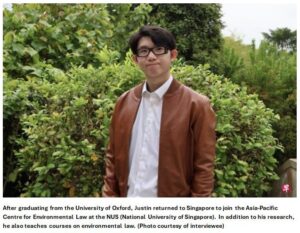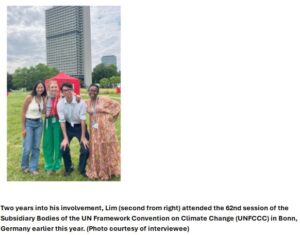Media - News
- Media
- Driving Climate Justice Through Private Law Thinking
Driving Climate Justice Through Private Law Thinking
By Cai Weiqian (Translated into English)

” Mines and factories wouldn’t exist without contracts and property rights at play. Seen this way, environmental problems and damage are actually the result of private law instruments, not merely the failure of public law intervention.”
Private law, which primarily governs contracts and property rights between individuals and corporations, often directly determines how resources are developed and used. In contrast, public law regulates the relationship between the state and private actors, such as how governments design and enforce environmental policies.
This is the central concern of 27-year-old Jusin Lim: how private law theories and models might be harnessed to address environmental challenges.
Growing up, Justin Lim loved playing the courtroom battle game Ace Attorney, and he thought the intricacies of legal language and argument were “cool.” That early fascination led him to set his sights on becoming a lawyer. After graduating from the University of Oxford with a law degree, he returned home to join the Asia-Pacific Centre for Environmental Law (APCEL) at the National University of Singapore.
“Working with APCEL always seemed like a natural fit as it is one of the few institutions in Asia with highly rigorous legal research across a variety of environmental problems and jurisdictions.” he said. For him, the motivation to protect the environment requires no elaborate justification: “Why wouldn’t you want to protect the space you’re living in?” He believes institutions and lawyers alike should rethink the role law can play in tackling environmental challenges.
A Behind-the-Scenes Force in Climate Dialogue
About two years ago, Lim joined the World’s Youth for Climate Justice initiative, where he now coordinates Singapore-related work. His daily responsibilities include co-authoring legal briefs with lawyers from other countries, engaging governments, and helping civil society groups understand advisory opinions issued by the International Court of Justice (ICJ) on climate change.
In his view, science is central to advancing climate discussions, though it can also complicate them. One example, he says, is geoengineering.
“People are looking to manipulate ecosystems to address climate change, but societies remain heavily dependent on fossil fuels. If the root problem is not solved, we should not even be considering pouring chemicals into the oceans to turn them into carbon sinks.”
A Calm “Pessimist”
In recent years, countries have held numerous dialogues on global warming, yet tangible progress has stalled, leaving many young people feeling powerless.
Justin Lim, however, does not let this make him anxious. He jokingly calls himself a pessimist who always imagines the worst outcome: “That way I don’t feel anxious, and policy discussions often end up bringing pleasant surprises.”
As someone who sees himself as a quiet force behind climate dialogue, he urges young people not to give up. “Every exchange contributes to change. We must keep going.”

Published in Mandarin on August 31, 2025, 4:34 p.m. on Lianhe Zaobao : https://www.zaobao.com.sg/news/singapore/story20250831-7422090
Translated into English by Yang Huiwen, Research Associate at APCEL

